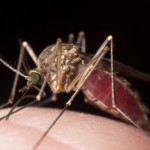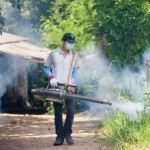I haven't thought about Dengue Fever in years, probably since I returned from an Air Force tour of duty in the Philippines in 1986. Now global warming and a fascinating NPR tidbit brought it back to the forefront of my consciousness.
Dengue, a major cause of illness and death in the tropics and subtropics, is a viral illness spread by mosquitoes. Worldwide it causes up to 100 million infections and 25,000 deaths per year. The typical result is a high fever, headache, muscle/joint/bone pain and a rash. There is no effective vaccine available and avoidance of mosquito bites is the most effective preventive strategy.
So why am I concerned enough about dengue to bring it to your attention? Simple, we're traveling more, cases have been seen in Florida, Texas and Hawaii; it's an endemic disease in Puerto Rico and, with our climate heating up, I'm concerned that we may see the disease spreading further in the United States and elsewhere. I'll add a link to information on dengue from the NIH's PubMed website.
http://www.ncbi.nlm.nih.gov/pubmedhealth/PMH0002349/
There's another concern; more than 5% of Key West residents monitored in a 2009 study had antibodies to the one of the four viruses that cause dengue. That puts them at risk for a much more severe form of the disease if they're bitten by a mosquito carrying a different dengue virus than they were first exposed to.
Dengue hemorrhagic fever is a serious problem, though relatively uncommon. It can lead to a generalized rash, bruising and bleeding and, potentially to a shock-like state, liver and brain damage, and seizures. Early diagnosis and aggressive care measures can improve survival rates, but half of untreated patients who go into shock die.
Most physicians in the US probably have never seen a case of dengue hemorrhagic fever. I have, in the Philippines, but that was the result of working there for a year and a half. So bringing this disease to the attention of doctors (and potential patients) in locations that previously haven't seen dengue makes sense to me.
But now for the good news. Research scientists in Australia recently released specially-bred mosquitoes, infected with a bacteria that is a parasitic microbe, seen in roughly a sixth of other neotropical insects. Apparently Wolbachia-infected mosquitoes will not spread dengue to humans, but when allowed to intermingle with uninfected mosquitoes, results, in a relative brief period, in those insects also being unable to spread the disease. The article on these experiments came out in Nature, online on the 24th and in print yesterday.
http://www.nature.com/nature/journal/v476/n7361/abs/nature10356.html
Now it's time for large-scale projects in multiple countries, but it looks like dengue may finally have met its match.


